Samsung NV20 Review
Review Date: October 15th 2007
Author: Mark Goldstein
Leave a comment about this Review
|
Image Quality
All of the sample images in this Review were taken using the 12 megapixel Super Fine mode, which gives an average image size of around 3Mb.
Noise
There are 7 ISO settings available on the Samsung NV20 which you can select at any time if the camera is in the normal shooting mode. Note that the image resolution is reduced to 3 megapixels for ISO 3200.There is no discernible noise at the slowest settings of ISO 80 and 100, as you would expect, but at ISO 200 noise is already appearing. By ISO 400 it is very obvious, together with coloured artifacts and blurring of detail. ISO 800 is for emergency use only, whilst ISO 1600 is virtually unusable. Here are some 100% crops which show the noise levels for each ISO setting:
ISO 80 (100% crop) |
ISO 100 (100% crop) |
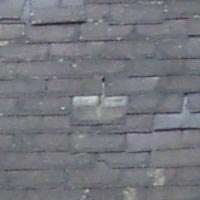 |
 |
ISO 200 (100% crop) |
ISO 400 (100% crop) |
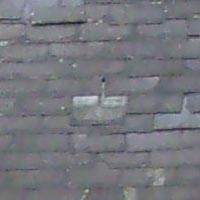 |
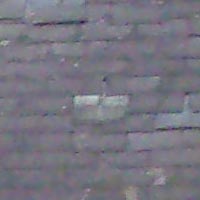 |
ISO 800 (100% crop) |
ISO 1600 (100% crop) |
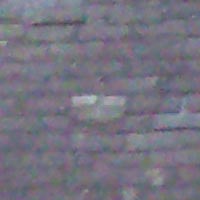 |
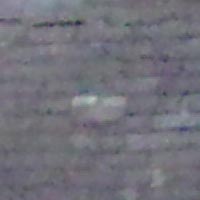 |
ISO 3200 (100% crop) |
|
 |
Sharpening
Here are two 100% crops which have been Saved as Web - Quality 50 in Photoshop. The right-hand image has had some sharpening applied in Photoshop. The out-of-the camera images are fine at the default sharpening setting of Normal. You can change the in-camera sharpening level to one of the preset levels (Soft, Normal or Vivid) if you don't like the default look.
Original
(100% Crop)
|
Sharpened (100% Crop) |
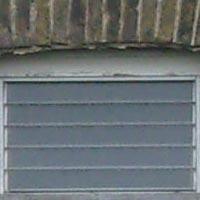 |
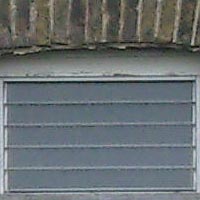 |
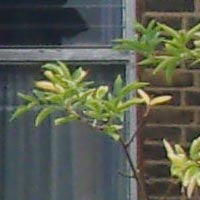 |
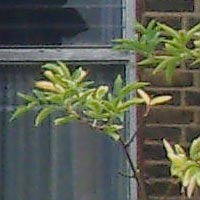 |
File Quality
The Samsung NV20 has 3 different image quality settings available, with Super Fine being the highest quality option. Here are some 100% crops which show the quality of the various options, with the file size shown in brackets.
|
12M
Super Fine (2.74Mb) (100% Crop)
|
12M
Fine (2.69Mb) (100% Crop)
|
 |
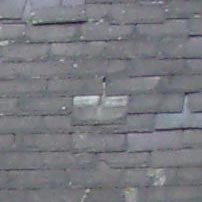 |
|
12M
Normal (1.91Mb) (100% Crop)
|
|
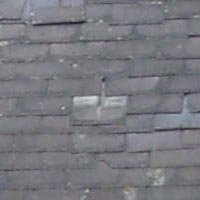 |
|
Chromatic Aberrations
The Samsung NV20 suffered quite badly from chromatic aberrations during the review. Obvious purple fringing was present around the edges of objects in high-contrast situations, and also often in places where you wouldn't really expect it, as shown in the examples below.
|
Example
1 (100% Crop)
|
Example
2 (100% Crop)
|
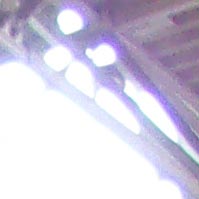 |
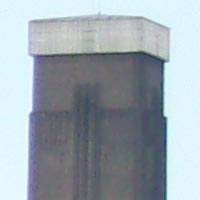 |
Macro
The Samsung NV20 offers a Macro setting that allows you to focus on a subject that is 4cms away from the camera when the lens is set to wide-angle. The first image shows how close you can get to the subject (in this case a compact flash card). The second image is a 100% crop.
|
Macro Shot |
Macro Shot (100% Crop) |
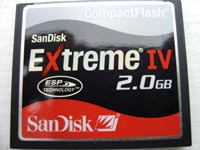 |
 |
Flash
The flash settings on the Samsung NV20 are Auto, Auto & Redeye reduction, Fillin flash, Slow sync, Flash off, and Redeye Fix. These shots of a magnolia coloured wall were taken at a distance of 1.5m.
|
Flash Off - Wide Angle (34mm) |
Auto Flash - Wide Angle (34mm) |
 |
 |
|
Flash Off - Telephoto (102mm) |
Auto Flash - Telephoto (102mm) |
 |
 |
And here are some shots of yours truly. As you can see, both the Auto setting and the Redeye Fix option caused a tiny amount of red-eye.
|
Auto |
Auto (100% Crop) |
 |
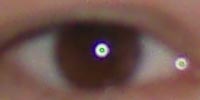 |
|
Flash - Redeye Fix |
Flash - Redeye Fix (100% Crop) |
 |
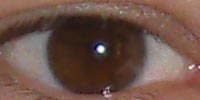 |
Night Shot
The Samsung NV20's maximum shutter speed is 15 seconds, which is good news if you're seriously interested in night photography. The shot below was taken using a shutter speed of 15 seconds, aperture of f/7 at ISO 100. I've included a 100% crop of the image to show what the quality is like.
|
Night Shot |
Night Shot (100% Crop) |
 |
 |
Advanced Shake Reduction
The Samsung NV20 has an Advanced Shake Reduction mode, which allows you to take sharp photos at slower shutter speeds than other digital cameras. To test this, I took 2 handheld shots of the same subject with the lens set to the same focal length, with the ISO speed set to 100. The first shot was taken with the camera set to Program mode, the second with it set to the ASR mode. As you can see, with Advanced Shake Reduction on, the images are definitely sharper than with it turned off. The Samsung NV20 appears to increase the ISO speed if neccessary and perform some extra in-camera processing (it takes a few seconds for the image to be processed). However, I found that it only ever increased the ISO to 200, even when the shutter speed was greater than 1 second, resulting in blurred results. Also, if you are more experienced, you will know how and when to change the ISO speed yourself to compensate for poor lighting. Therefore the Advanced Shake Reduction mode seems to be targetted more at beginners, and is only genuinely useful in certain situations. Here is a 100% crop of the image to show the results.
| Shutter Speed / Focal Length |
Anti Shake Off (100% crop) |
Anti Shake On (100% crop) |
| 1/13th sec / 34mm |
 |
 |
| 1 sec / 34mm | 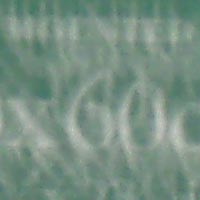 |
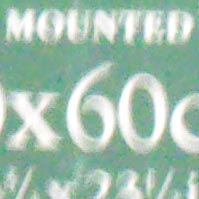 |
Overall Image Quality
The Samsung NV20's image quality is below average. The Samsung NV20's main drawback in terms of image quality is noise, with the relatively slow speed of ISO 200 showing some noise, particularly in shadow areas. The noise gets progressively worse as you go from ISO 200 to ISO 400 and finally the pretty unusable ISO 800 and 1600 settings. The Samsung NV20 didn't handle chromatic aberrations very well either, however, with purple fringing effects appearing in high contrast situations. The 12 megapixel images were sharp straight out of the camera at the default setting of Normal, and you can also change the in-camera sharpening level if you wish. The night photograph was OK, with the maximum shutter speed of 15 seconds allowing you to capture enough light for most situations, but the resulting images were quite noisy. Macro performance is about average, allowing you to focus as close as 4cms away from the subject at the wide-angle lens setting. Advanced Shake Reduction is a feature that promises to set this camera apart from its competitors, but unfortunately it seems to be little more than an automated way of increasing the ISO speed. The pop-up flash unit worked well indoors, with no red-eye and good overall exposure.
|
![]() PhotographyBLOG
is a member of the DIWA
organisation. Our test results for the Samsung NV20 have been submitted to DIWA
for comparison with test results for different samples of
the same camera model supplied by other DIWA
member sites.
PhotographyBLOG
is a member of the DIWA
organisation. Our test results for the Samsung NV20 have been submitted to DIWA
for comparison with test results for different samples of
the same camera model supplied by other DIWA
member sites.
